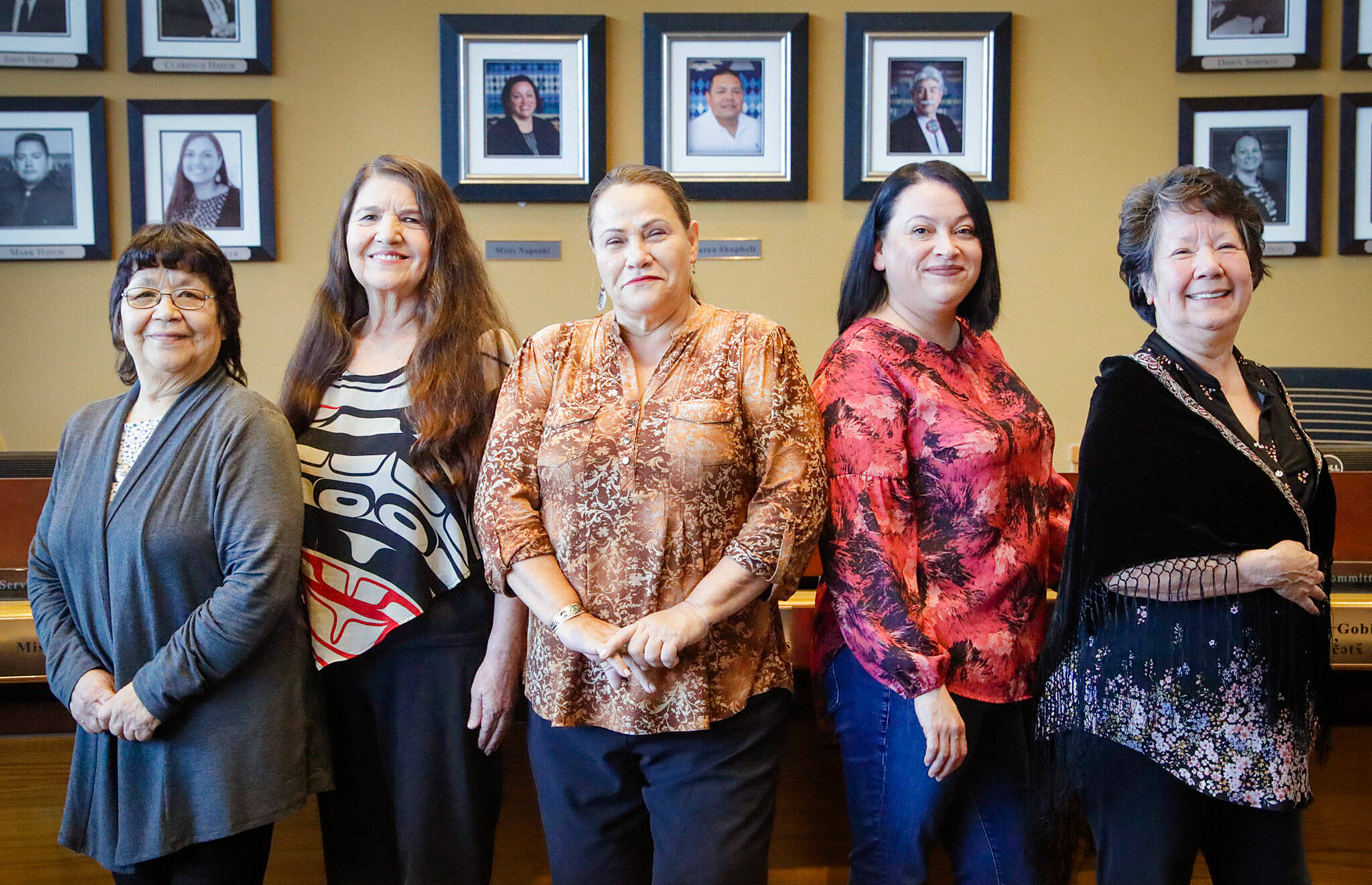TULALIP — Edith Percival Parks became the first Tulalip woman to serve on the Tribes’ Board of Directors in the 1930s.
Last weekend, tribal members elected Parks’ granddaughter Debra Posey to lead alongside four other women. It’s the first time in history five women have served on the seven-person board.
“It’s a pretty historic time for us,” Posey said.
Over 1,200 tribal members voted in last Saturday’s election.
Candidates for the Tulalip Tribes Board of Directors do not run head-to-head but are elected based on total votes received. Two of the seven board seats were up for election this year. The two top vote-getters were Posey and incumbent Misty Napeahi, who earned 507 and 566 votes, respectively. Posey will be sworn in Saturday, taking Glen Gobin’s seat.
About 52% of tribal members are women.
“We really needed a strong leader in there to work with the chairwoman,” said former board member Les Parks. “That’s Debbie Posey.”
Posey, Parks’ cousin, previously served on the board during the Boldt decision years.
About 16 women have served on the tribes’ Board of Directors since its inception on March 14, 1936, according to data from Hibulb Cultural Center.
That’s less than one third of all board members.
Among those women was Hariette Shelton Dover, a federal Indian Boarding School survivor and cultural leader credited with restoring the Salmon Ceremony in 1976. Prior to her elected leadership, Shelton Dover helped her father to fight for treaty rights in a federal land claims case.
Another was former vice chair Deborah Parker, a central figure in advocating for the 2013 Reauthorization of the Violence Against Women Act, who is now participating in the U.S. Department of the Interior’s Federal Indian Boarding School Initiative, said Chairwoman Teri Gobin.
Strong women have always led the tribes, though not always in elected roles, Posey said. Some that come to mind, she said, are leaders like Delores Gobin, former executive director of the tribes, and history-bearer Gwen Sheldon Hatch.
Gobin served on the first woman-majority board in 2017. In 2019, she was elected chair. She was reelected chair last week, taking nearly 69% of the vote.
Over the past decades, Board Treasurer Pat Contraro said, tribal members have subscribed to the ideals and gender roles of “mainstream society.”
But “in the past, women pretty much ran the tribe,” Contraro said. “We’re just now coming back into what we’ve always been historically.”
Today’s board members say they keep past leaders close at heart.
Vice Chair Napeahi said she always carries a piece of her grandmother with her for strength.
“I always wear a ring that was my grandma’s, if I ever feel like I’m going into a really tough, tough situation and I kind of need her support,” Napeahi said. “She was a really strong woman — probably the first feminist that I ever knew.”
Posey, the board’s secretary, also looks to her grandmother’s wisdom.
“I was taught my entire life about treaty rights and sovereignty, and what it is to be an Indian,” Posey said. “My grandmother always said you have leaders for one reason only and that’s to improve the lives of your people.”
Gobin, the daughter of the tribes’ longest-serving tribal chairman, said her leadership style largely comes from years of listening to elders.
While working for the tribes’ elders program, she often spent more time with elders than her younger friends.
“I was really hungry for their knowledge about the history and the stories,” she said. “I worked with Harriette (Shelton) Dover, and some really iconic people: Barney Gus, Cecilia Jones — they were really strong leaders.”
Gobin said she hopes the board can use their ancestor’s wisdom to help the tribes heal from the pandemic.
As case numbers fall, the board is in support of reviving annual gatherings, Coastal Jams and traditions that strengthen people’s connection with the land and their relatives, Gobin said.
“These women are all go-getters and we hope to accomplish a lot,” Gobin said.
Marie Zackuse, who has served on the board since 1990, said she always leans on knowledge passed down by her elders and ancestors.
After 14 years on the board, Zackuse was first elected as an executive officer in 2004. Previously, she said, she was used to being “the woman behind the man.”
Now, the board’s executive officers are all women.
“Marie (Zackuse) has held a seat at the table for a number of years — sometimes being the only woman up there,” Napeahi said. “And so I’m really just honoring the space of where our women have been before.”
Isabella Breda: 425-339-3192;isabella.breda@heraldnet.com. Twitter: @BredaIsabella.
Talk to us
> Give us your news tips.
> Send us a letter to the editor.
> More Herald contact information.

























